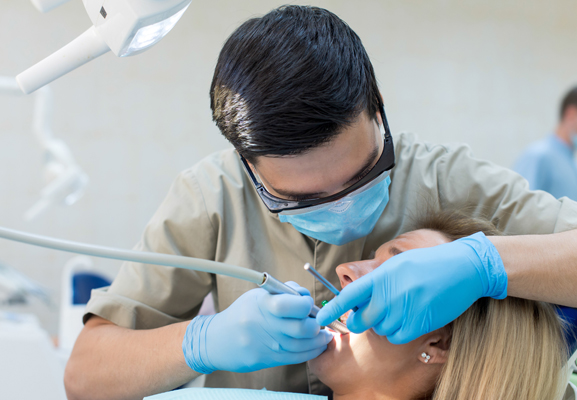Signs a Chipped Tooth Is a Dental Emergency

A chipped tooth counts as a dental emergency when the damage is extensive enough to leave the tooth's pulp chamber compromised. Such injuries often come with inflammation, bleeding, tenderness and excruciating toothaches.
The pulp chamber houses a tooth's blood vessels and nerves, so damage to it leaves these soft tissues vulnerable to infection. Irritants in the mouth, like acids, sugar and bacteria, can aggravate the tooth, leading to toothaches and increased sensitivity.
Treating a severely chipped tooth
A chipped tooth that counts as a dental emergency will likely require root canal therapy. A local anesthetic is administered during the treatment, so all the patient feels is pressure from the dentist working on their mouth with their tools.
A root canal involves the dentist drilling a hole into the tooth and using files to remove the soft tissues in the pulp chamber. When that is done, the dentist applies medication to the pulp chamber to kill off any infection there. The tooth is sealed with gutta-percha to close up the pulp chamber and the created hole.
The dentist might then cover up the repaired tooth with a crown to protect it from irritants in the mouth. The crown will also restore the tooth's appearance and protect it from bite forces.
Let us take a look at a few signs that let you know your chipped tooth requires emergency dental care:
Bleeding from inside the tooth: Blood coming from inside a tooth is usually a sign that the pulp chamber is compromised. If blood can seep out of a tooth, bacteria can get into the tooth via the same crack. Such injuries often come with toothaches that make it clear an emergency trip to the dentist is necessary.
A loose tooth: A chipped tooth that has become loose is more likely to morph into other dental issues. The tooth might be loosened by the trauma that led to the chip, and it might fall out if left untreated. That creates a need for an oral prosthetic like an implant.
Excruciating pain: Toothaches do not occur for no reason. They are the body's way of letting the brain know that something is wrong somewhere. Persistent toothaches that leave you in agony are signs that an emergency dentist is needed. The worst types of toothaches are often not responsive to over-the-counter painkillers. A dentist needs to treat the underlying cause to get rid of the pain and discomfort.
Other treatments for chipped teeth
Those with chips that only affects the outer layers do not require emergency care if there is no significant pain. A routine trip to the dentist works in such cases. Treatments used to treat minor chips include:
- Dental bonding
- Veneers
- Enamel reshaping
- Crowns
Restore your chipped tooth
Dealing with a chipped tooth? Give us a call or stop by our Chicago clinic for the treatment you need. Our dentist will educate you about your options. We also provide emergency dental care.
Request an appointment here: https://www.yourfamilysmiles.com or call Family Dental Care of Chicago at (773) 250-1194 for an appointment in our Chicago office.
Check out what others are saying about our services on Yelp: Read our Yelp reviews.
Recent Posts
Cosmetic dentists focus on improving the appearance of teeth while maintaining oral function. Whether addressing discoloration, misalignment, or structural damage, modern cosmetic treatments enhance the beauty of a smile. With technology and material advancements, cosmetic dentists offer treatments that improve aesthetics and contribute to long-term wellness.One of the most sought-after cosmetic dental treatments is professional…
An emergency dentist is vital when unexpected dental problems arise, providing immediate care to address pain, damage, and other urgent issues. Comparing an emergency dentist to an oral surgeon is important for understanding which professional can best meet a patient's needs. While both play critical roles in maintaining oral health, their training, focus, and treatment…
Orthodontics is a holistic way to improve the look and function of teeth. Orthodontic appliances exert steady and gradual pressure to improve the alignment of the teeth. Common appliances are braces, which do most of the heavy lifting for patients with moderate to severe malocclusions.Do you think that your child needs orthodontics? Keep going to…
Choosing dental implants is a great idea if you are looking into your tooth-replacement options because you are missing one or more of your teeth. This option is one that offers benefits that other replacement options do not, which is why so many patients are choosing implants to replace their missing teeth. Other replacement options…


